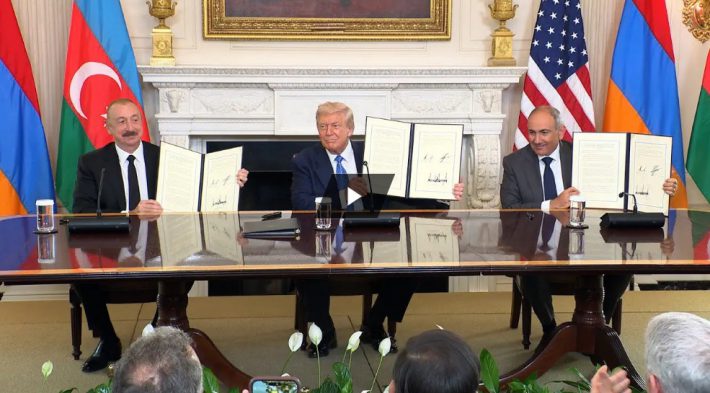The Jewish community in Baku celebrates the US-brokered Azerbaijan–Armenia peace agreement, calling it a step toward regional unity and a major setback for Iranian influence.
The Jewish community of Baku, Azerbaijan, has warmly welcomed the historic peace accord signed in Washington between Azerbaijan and Armenia — a landmark deal ending decades of hostility and opening a new era of regional cooperation.
Rabbi Zamir Isayev, Sephardic Chief Rabbi of Baku, praised the move as a message of peace and unity that also strengthens the region’s resistance to Iranian aggression.
“It is no surprise that Iran is alarmed by this agreement,” Isayev noted. “This is a natural continuation of Azerbaijan’s policy of building bridges between nations and religions.”
The agreement, signed on August 8 by Armenian Prime Minister Nikol Pashinyan and Azerbaijani President Ilham Aliyev, finalizes a peace framework already approved by both sides and confirmed by their foreign ministers in Washington.
Beyond ending one of the longest-standing disputes in the post-Soviet space, the deal carries major strategic implications for Israel — curbing Tehran’s ability to use Armenia as a back channel for illicit procurement, including materials for its nuclear program.
Jewish organizations and Israeli diplomats have quietly supported the agreement for years, citing Azerbaijan’s unique status as a Muslim-majority nation with no history of antisemitism and deep ties to Jerusalem. Some advocates have even suggested adding Azerbaijan to the Abraham Accords as a model of Muslim–Jewish cooperation.
The TRIPP Corridor: A New Geopolitical Game-Changer
One of the agreement’s most ambitious projects is the creation of a transportation corridor linking Azerbaijan’s mainland to the Nakhchivan exclave via Armenian territory along the Iranian border. Now renamed the “Trump Route for International Peace and Prosperity” (TRIPP), the corridor will be built and operated by American companies.
Analysts say the route will become a vital East–West trade link between China and Europe — bypassing Iran entirely and reducing Armenia’s reliance on Tehran.
Iran and Russia: The Last Holdouts
Tehran reacted with fury. Ali Akbar Velayati, senior adviser to Supreme Leader Ali Khamenei, threatened a “strong Iranian response” to any attempt to establish the corridor, calling it a threat to Iran’s territorial integrity. The Iranian Foreign Ministry also voiced alarm over “foreign intervention” along its northern border.
Russian officials, similarly sidelined by the US-brokered deal, are expected to coordinate with Iran in efforts to disrupt the agreement’s implementation.
Israeli analyst Alexander Grinberg of the Jerusalem Institute for Strategy and Security said the deal “triggered hysteria in Tehran,” as even partial Azerbaijani control over the route would cut Iran’s land access to Europe and Russia. He noted that the corridor is one of the strategic assets Tehran fears losing most, adding:
“The Iranian regime is weaker today. Understanding its ‘united fronts’ doctrine is key to countering its threats — and the Zangezur Corridor could be a decisive lever.”
With the deal now in place, Baku’s Jewish community believes the US-led breakthrough not only closes a bloody chapter in Caucasus history but also reshapes the balance of power — to the detriment of Iran and Russia.





